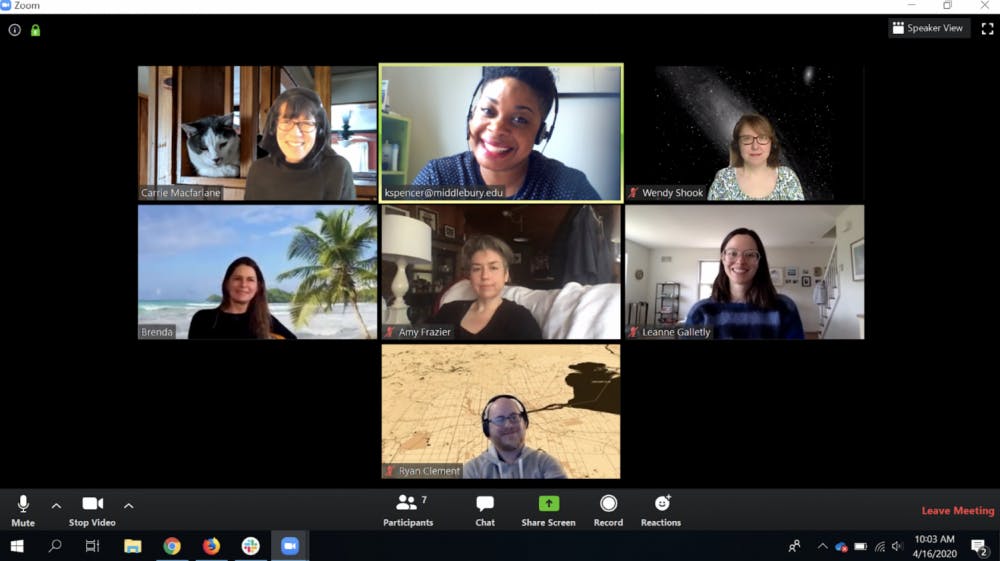 The seven librarians in the research and instruction group meet regularly to talk about how we’re connecting community members with library resources. This week, we’ve examined how our work has been affected by the pandemic. While the library is closed, we’ve been using both tried-and-true and experimental forms of communication to help researchers get what they need. To consult in real time with these research and instruction librarians, make appointments using our go links listed below:
The seven librarians in the research and instruction group meet regularly to talk about how we’re connecting community members with library resources. This week, we’ve examined how our work has been affected by the pandemic. While the library is closed, we’ve been using both tried-and-true and experimental forms of communication to help researchers get what they need. To consult in real time with these research and instruction librarians, make appointments using our go links listed below:
- go.middlebury.edu/amy
- go.middlebury.edu/brenda
- go.middlebury.edu/carrie
- go.middlebury.edu/katrina
- go.middlebury.edu/leanne
- go.middlebury.edu/ryan
- go.middlebury.edu/wendyshook
Also know that there are 13 librarians at Middlebury. Find your subject specialist at go.middlebury.edu/liasions. Or, reach them all at go.middlebury.edu/askus/. If you need the library to purchase something, just ask by logging in at go.middlebury.edu/requests.
Katrina Spencer: How are you reaching community members and how is this different from normal?
Brenda Ellis: I’m still teaching a few library workshops online via Zoom, and for those classes, I create exercises to “flip the classroom” i.e. students complete a guided exercise and we use our online time for demos, discussion and Q&A.
Carrie Macfarlane: I’m still answering questions via email and chat, and I’ve been able to continue to meet with students, via Zoom, for individual research consultations. The main difference is that I’m now more proactive, writing to entire classes and taking advantage of every opportunity I find to tell students how to reach me.
Wendy Shook: I’m working with faculty to support their technology needs for remote instruction, and helping them rethink how they deliver their course content. In concert with DLINQ, we’ve held drop-in distance learning workshops, and a lot of one-on-one support over Zoom.
Katrina: What new challenges does this present and how are they being addressed?
Brenda: We’re all adjusting to the new norm of communication online. I miss seeing students face-to-face. It’s my favorite part of my job. Students still email with questions, but I don’t think students realize that they can still request a consultation with us online using our go-links. I’d love to hear from you.
Carrie: I really miss seeing students and faculty in person! But I love the “remote control” feature in Zoom. It allows a student and me to use the same computer. We do lots of searching and revising together in order to uncover the best primary sources and literature reviews.
Ryan Clement: Access to materials can be an issue. While many resources are digitized and available to remote students, others aren’t. This includes things like data and maps, and without the ability to get into the library, materials cannot be digitized on demand. Also, students can’t just drop in. Many students would visit my office with quick questions during the busiest times of the semester. Now we have to do more planning ahead.
Wendy: Oddly enough, I’m communicating with more faculty and students now. This is, in small part, because I’m more accessible electronically than I might be in Armstrong, and partly because people are having a harder time finding materials. We’ve got your back.
Katrina: What are your hopes for the end of the semester?
Brenda: The future of work post-college will likely involve more remote work and I see that as a positive. Doing anything in new ways can feel daunting, but I hope students will feel more confident not only with communicating online, but also navigating and critically evaluating the world of online information.
Carrie: Professionally, I hope that students and faculty will remember to contact a librarian even if they think they don’t have a research question. Usually, once someone starts talking about a project, we realize there’s a way we can help. Personally, I hope we emerge from this crisis in good health. We’re all looking forward to doing all the things we’ve missed.
Ryan: I hope that all of our library users experience what we already know — despite the fact that our space and our physical materials are important, our library is much more than those things. Our library is the people and services that make it up. Libraries have been flexing, shifting, and adapting for our communities for decades, and we will continue to do so.
Katrina Spencer is the college’s literatures and cultures librarian.
Comments




